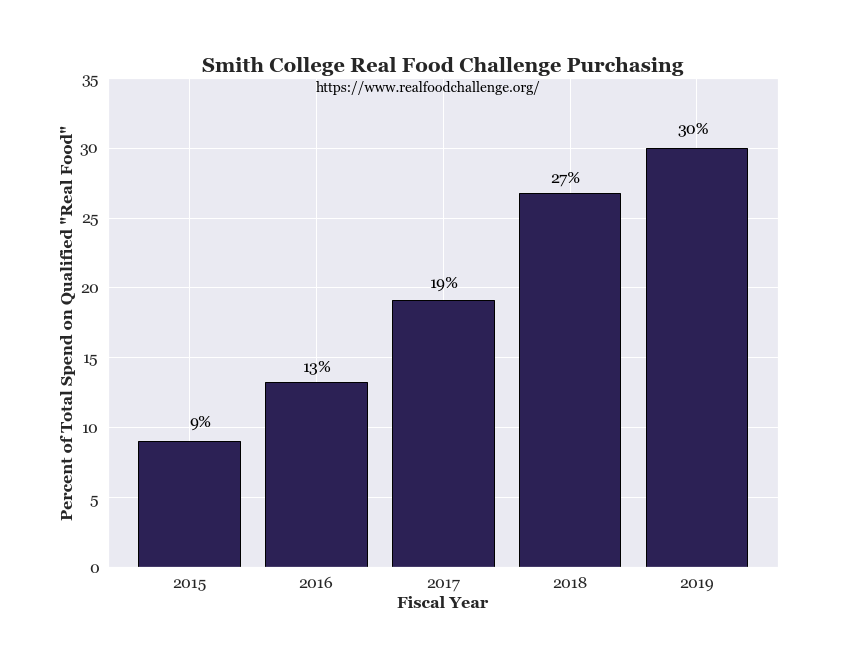Food and Dining
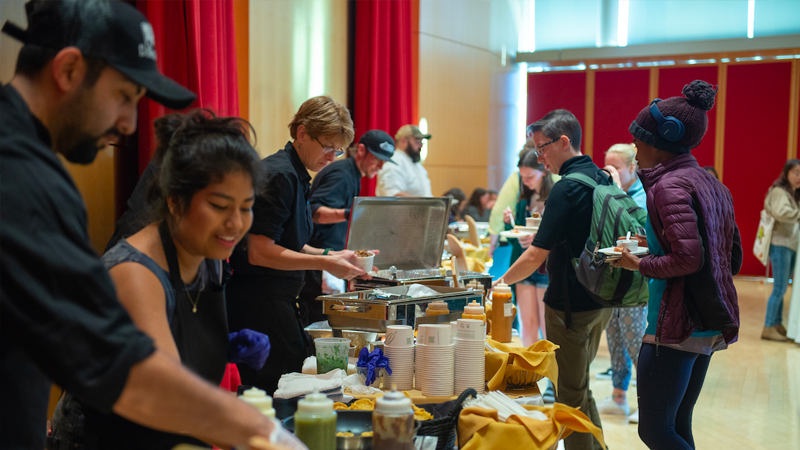
We have a long history of providing healthy, delicious, sustainable, and culturally-relevant food for students. See the food-related initiatives and projects students, faculty, and staff are involved in on campus! Visit Dining Services’ commitments to sustainability to learn more.
Recent Actions in Food and Dining
The Real Food Challenge
On October 21, 2016, Smith signed onto the Real Food Challenge, a national initiative with goals that include promoting sustainable agriculture, fair labor practices and humane treatment of animals. Pledging that by 2020, 20 percent of the food provided on campus would meet the Real Food Challenge standards, Smith fulfilled its promise in less than a year. As of 2021 we have achieved 26% Real Food.
Learn how Lily Carlisle Reske '17 learned about and advocated for food justice.
Local Farms
We’ve been supporting local and small farms for decades! For example, we’ve sourced produce from Outlook Farms in Westhampton, MA for over 50 years! Learn more about our other local producers here.
Plant-based Foods
Smith has recently begun reporting on its plant-based food purchasing for AASHE STARS. In FY 2019, 47% of our purchases were plant-based. Plant-based foods are those composed primarily of unprocessed or minimally processed foods and culinary ingredients or are a vegetarian/vegan alternative to meat or dairy. Ultra-processed foods do not qualify as plant-based. Students have been our best advocates for more plant-based foods in the dining halls and continue to help us research how to educate our community on the benefits of eating plant-based.
In 2020, students in the Environmental Science and Policy capstone course analyzed current purchasing practices in beef and dairy milk — two of the highest GHG-emitting food categories both at Smith and globally - giving Smith Dining the resources to run rough emissions and cost analyses for different substitution scenarios that help to decrease emissions.
Reducing Smith College’s Dining GHG emissions: An analysis of beef and milk substitutions
Whole Animal Whole Region
In October 2018, Smith, along with several other partner institutions, received a grant from Henry P. Kendall Foundation that helps local farmers by creating a market for whole animals to be sold to consistent consumers instead of only the sirloin and tenderloin cuts. Smith made a commitment to purchase whole beef and pork from farmers in New England. As of 2020, we are sourcing half of all the meat served in dining halls from 17 local farms with antibiotic free, grass and non-gmo grain fed animals. We have purchased over 400 whole animals to date. In the next few years, we expect to source 100% of all meat from local farms. Student advocacy and involvement has been and will continue to be a large part of ensuring that we reduce our carbon-footprint associated with meat consumption and source more sustainability.
Year on Climate Change “Global Flavors” Event
At the 2019 opening conference for the Year on Climate Change, students from around the world worked with Dining Services to prepare family recipes from their home region but with local New England ingredients. This project opened up an opportunity for our diverse student population to create and share their cherished recipes with the greater community; it also opened up an opportunity to showcase local New England foods to the greater community as well. Two students, Rosie Li ‘20 and Micaela Gonzalez ‘21 created and executed the program.
Micaela Gonzalez
In fall 2019, I helped organize “Sustainable Reimaginings of Global Flavors” for the opening reception of the Smith Year on Climate Change conference. Students submitted recipes and worked with chefs on campus to reinvent their special dish using sustainably sourced local ingredients. The event was an opportunity for students with ties to different parts of the world to reconnect with important culinary traditions from a creative and sustainable perspective. Recipes included picadas using masa from Mi Tierra restaurant and a remake of traditional conch fritters with local clams. I am inspired by the possibilities that shifting our relationship to land and food makes possible.
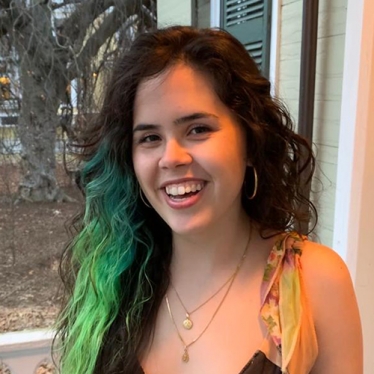
Grab & Go 2.0
Starting fall 2022, Smith Dining reintroduced the Grab & Go system with reusable meal containers for take-out dining. To start, a student gives their free token to a dining hall staff member, then gets a container in return. Students can fill the sanitized containers with food directly from the buffet and, when done eating, deposit the used containers in vending machines in the Campus Center, Tyler House and Scales House to receive a token for next time. This system keeps tons of waste out of the landfill stream!
Read more and get your questions answered in the Frequently Asked Questions below.
Changing the world from disposable to reusable one meal at a time.
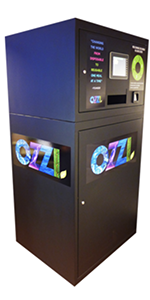
Smith is moving away from single-use containers! Each student on the dining meal plan will receive 2 free tokens to participate in the program at the beginning of the academic year. When students visit a dining room they may redeem their token for a reusable container. They can then fill their container with a meal to go. After using the container, students rinse it and return it to a container machine located in the basement of the Campus Center, Tyler dining hall entryway and/or the Scales entryway. Follow the directions to insert the container into the machine and receive a token that can be used in any of the dining rooms.
How will I get my free token at the start of the academic year?
First year and transfer students will receive their tokens at the Dining Services table at Central Check In.
Most upper class students will get theirs when they pick up their room key from Res Life. The only exception to this will be students that live in Cutter/Ziskind house. They will pick up their tokens from The Dining Room Coordinator in the Cutter/Ziskind Dining Room.
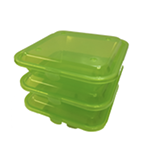
Where can I use my reusable container?
You can use your Grab and Go 2.0 container in any of the residential dining rooms on campus.
What sizes do the reusable containers come in?
You will have the choice of either an 8x8 clam shell style container or a 12 oz. soup container.
How do the containers get cleaned?
A Dining Services student worker (an Ozzi Coordinator) will remove dirty containers from the Grab and Go receptacle machine and wash them in the dish pantries in between meal periods, and redistribute them to the dining halls.
Where are the container machines located?
Ozzi machines are located in the basement of the Campus Center, Tyler dining hall entryway and the Scales entryway.
Why can’t I reuse my container without having it washed by a Dining staff person?
For health and safety reasons, only properly cleaned and sanitized containers handled by Dining staff can be used in the dining rooms to help prevent any cross contamination.
Can I exchange a dirty container for a clean container in the dining hall?
No, containers need to be returned to a machine, where students will receive a token to be exchanged for a container. The container deposit machines allow dining staff to keep track of usage and ensure the containers are sanitized. Additionally, not all dining halls will be able to clean the containers.
Do I have to rinse my container before depositing it into the machine?
Dining staff recommends rinsing your container. If you are unable to rinse your container, please at least empty the container of all food before returning.
What if I don’t have a token?
If you lose your tokens or need another one you can purchase a new one from the Campus Center Cafe for 5 dollars.
What if I lose my container?
If you lose your container you can purchase a replacement token from the Campus Center Cafe for 5 dollars.
What if I have the need for multiple containers?
You may purchase as many tokens as you would like from the Campus Center Café for 5 dollars each.
Can I redeem my token for cash?
No, tokens can only be used for containers.
Can I use the container at Kosher or Dawes?
No, the containers cannot be used at Kosher or Dawes. Paper products will be available at Kosher and at Dawes for meals.
What If I dine Halal? Are the containers kept separate?
No, but dining will continue to allow personal tupperware that holds one meal portion, if you first put your portion on a china plate and transfer it to your container.
What happens if the container machine is not working?
The container machine is networked to track usage and technical errors, and will notify the dining office. Any problems will be corrected as soon as possible.

